~From Communications Coordinator Jill Salahub
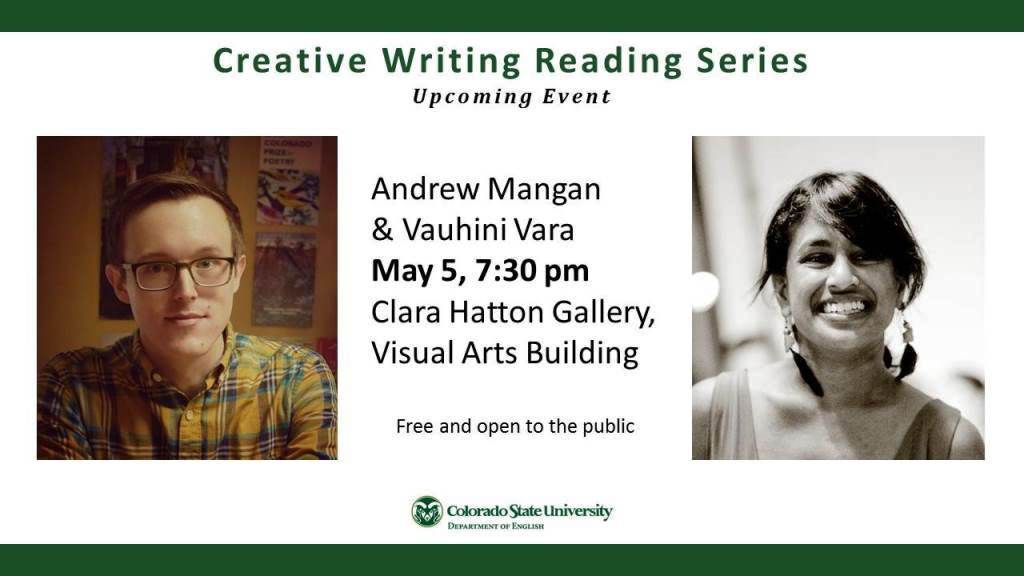
Usually one of our communications interns goes to the reading and writes about the event. They’ve written some really great pieces this semester that give a good sense of what it’s like to go to a reading, what it’s like to be read a particular piece by the various writers, to be in the audience on a specific night. Our hope is that this might inspire those who haven’t already gone to attend a reading, or for those who wanted to but couldn’t make it, to give them a taste of what they missed. However, at our last meeting of the semester the day before the event, it became clear to me that my interns had too much work to wrap up and not a lot of time remaining, so I decided to attend and report back myself.
It made for a long day. I worked my regular “shift,” attended a retirement celebration for John Calderazzo and SueEllen Campbell, and then had a impromptu dinner with a few colleagues before heading to the reading. I’m not going to lie, I was tired and raw by the time I got there. But when I entered the Clara Hatton Gallery, all that fell away. The space itself is a wonderful mix of calming and energizing, the ghosts of each previous reading and the echo of all the art that came before infusing the space with a sense of ordinary magic, just like all the best book stores and yoga studios and jazz clubs. And even though it was a public event, it felt more like a group of friends gathering.

Camille Dungy started off the night, musing about what might have happened to the great but soft spoken Billie Holiday if she’d been born in a time before microphones, and how artists are often at the mercy of the technology of the time, for better or for worse. It was a fascinating thing to consider, and I could have listened to her say more, discuss and write about just that the rest of the night, but that wasn’t why we were there. Camille then pointed out that “until 15 minutes ago, Andrew was the assistant [to the Director of the Creative Writing Reading Series] and now he’s the star!” (Cole Konopka will be taking over the duties of Assistant to the Director of the Creative Writing Reading Series). Camille gave thanks to the various sponsors of the Reading Series, finishing by saying that with the help of Andrew and Abby Kerstetter, “we had a really killer reading series this year.” Coming up in Fall 2016 is alumnus Steven Church, poet Gregory Pardlow, poet and non-fiction writer Tess Taylor, and the English department’s newest faculty member, non-fiction writer Harrison Fletcher.
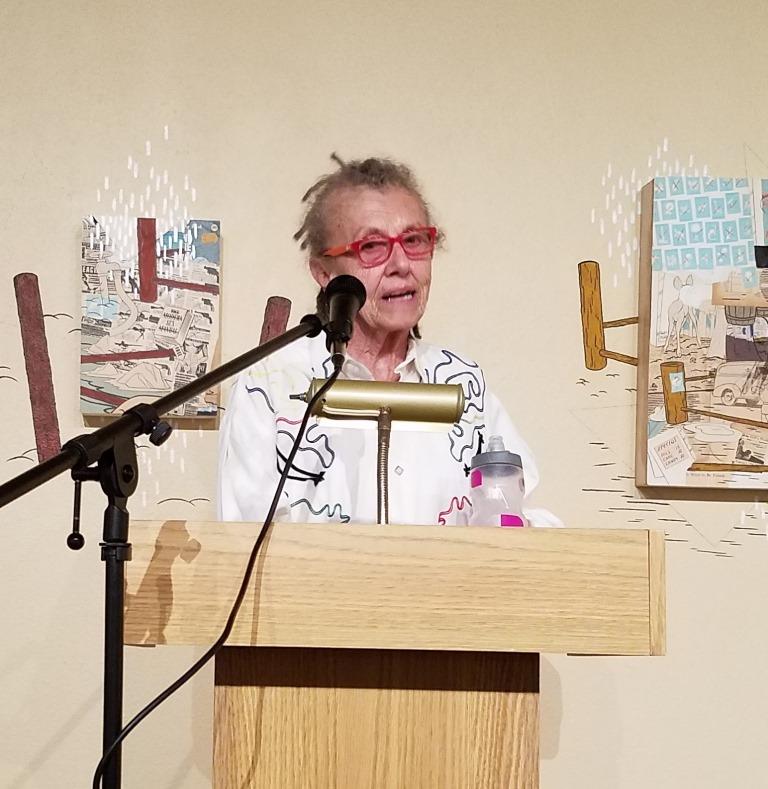
Next up was Leslee Becker, introducing Vauhini Vara, who recently published a great piece, “Is Smoking Pot the New Disneyland for the Family?” about weed tourism in Colorado, and who just so happens to be married to English department Assistant Professor Andrew Altschul. Towards the end of her intro, Leslee said,
Look up Vauhini on the web, and you’ll see a list of achievements and articles, including many on student loans, so be sure to speak with her after the reading. And now I come to what’s not on a website, inside dope from Andrew Altschul: “Her love of words traces back to having twice been a contestant in the National Spelling Bee, and coming in third when she was 12 years old. Her work as a professional journalist began when she was a teenage reporter for the Seattle Times, most notably interviewing Beck backstage at a concert about his hair-care products. She was also an editor of the Mercer Island newspaper and the Stanford Daily, though it’s unclear if she pursued hair-care scoops at those publications.”
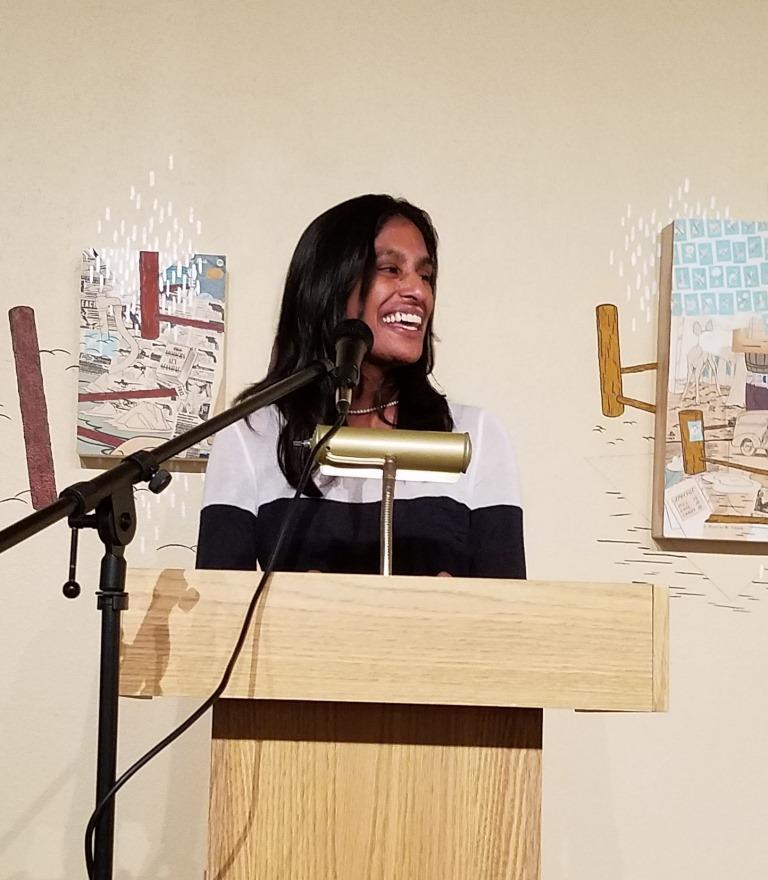
Vauhini read a “shortened version of a short story” about a young college aged woman of color who losses her brother to cancer, then gets a summer job as a telemarketer, and then 9/11 happens. The opening line of the story draws you in immediately, “It was the summer of 2001. Our whole house stunk.” The protagonist had lost her brother to cancer and things were falling apart at home. Before his death, he’d believed he was a prophet. “The meaning of life is to find one’s own meaning,” he’d told a group sitting in their living room. But after his death, “my brother had died and my house smelled rancid.” She finds a strange escape at a telemarketing job, making a “commission for each conversion” and longing for “an irate,” a customer so aggressive she had permission to hang up on them. Then 9/11 hits, and she struggles with how those who weren’t there or involved react, wrestles with her anger, asking “Did you know someone who died?!” only to note in the very last line of the story, “I was a living person in a land of living persons. All I have left is you people.”
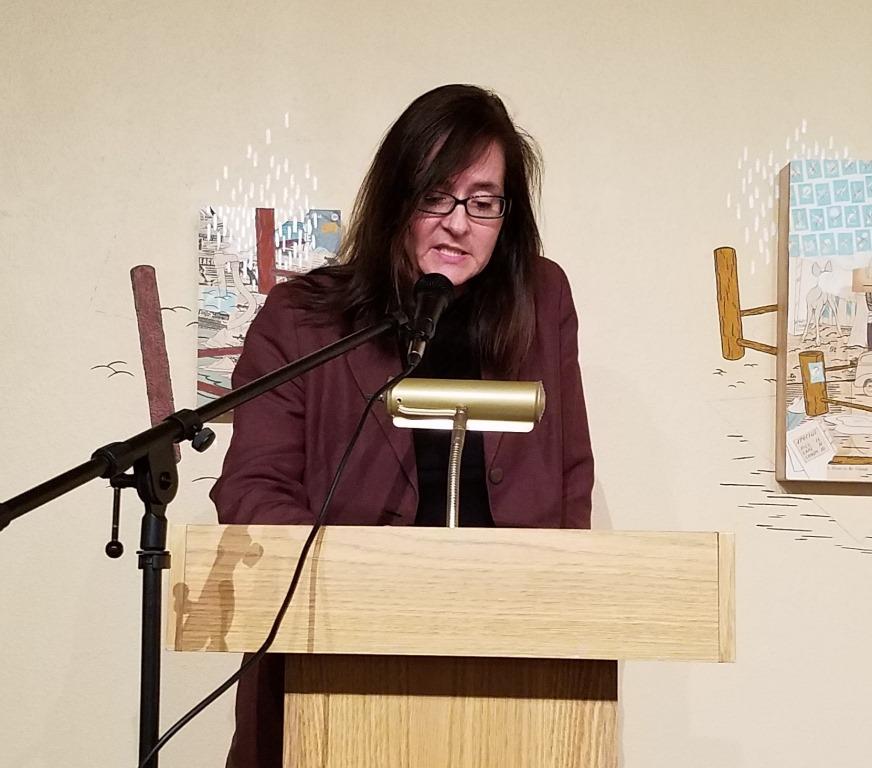
EJ Levy was up next, introducing Andrew Mangan, the final reader of the 2015-2016 Creative Writing Reading Series. She referenced his courage as a writer, writing about “those typically overlooked,” how his writing was heartfelt without being sentimental, non-sentimental without being cold. She said he doesn’t just write to write well, but writes about what matters.
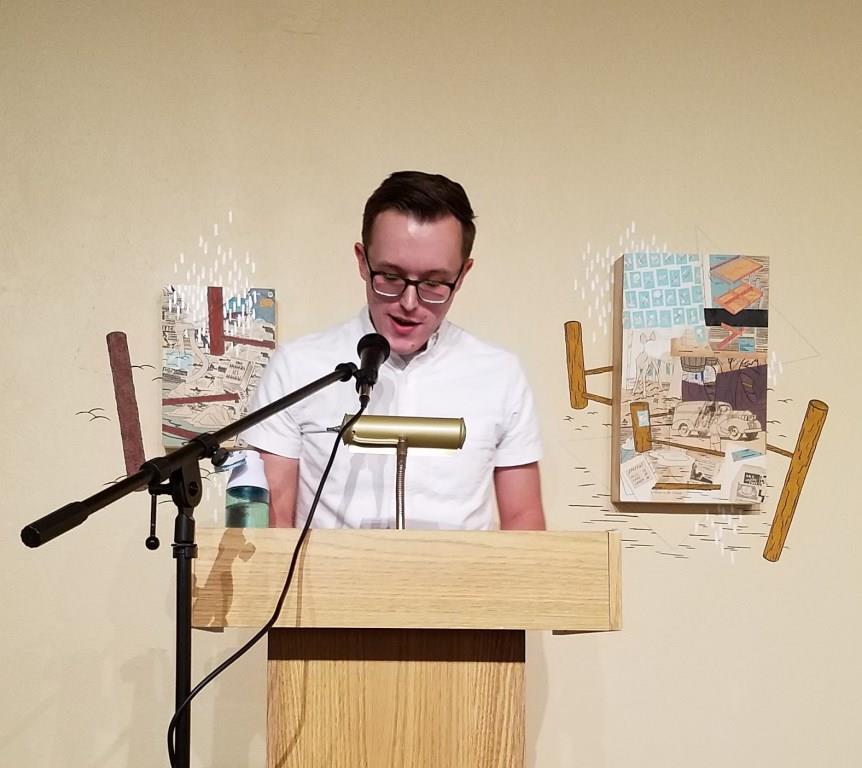
Andrew started by thanking his parents, who had traveled to see him read in person, and then his fiance Hanna. Then he launched into a story about Percy, an elementary school kid not so lovingly nicknamed “Roadkill” by his classmates. In the story, he slept on a futon in the living room, and his mom worked retail and his dad had a flea market booth. Neither one of his parents made much money, so the family struggled. Sometimes their electricity got turned off because they hadn’t paid the bill or they had to get food from the local food pantry. One set of grandparents had been killed in a tornado and the others were in a psych ward. An “opportunity” comes when a snake handling preacher makes Percy’s dad a deal for “snake rent” — Percy’s dad catches and keeps poisonous snakes used at the church in return for a monthly fee, money the family needs. A moment in the story that shines with more than just literal meaning is when Percy’s dad explains the preacher is able to handle the snakes without getting bitten because he has Percy’s dad starve then, to make them tired, docile, easy to handle. “They have no clue what’s happening to them.” Percy tries to be a regular kid amongst the strangeness and scarcity of his life, longing for a Sega and in love with his new light up shoes. His mother at one point says, “I hate this” and “he could tell ‘this’ mean something more, that they couldn’t afford to want.”
Without planning it, the stories read that night were thematically similar, dealing as they did with loss, violence, loneliness, grief, and otherness. Two characters trying to find their way, trying to make sense of their experiences even when nothing made sense. The main characters were very different, as were their settings and particular problems, but I couldn’t help but feel they were of the same ilk. Similarly, the writers who read that night were kindred — masters of complex narrative, unafraid to peer into the darkness and report back, not just writing well but writing about what matters.
The Creative Writing Reading Series at CSU is organized by English Department faculty and the Organization of Graduate Student Writers (OGSW); Creative Writing faculty serve on a rotating basis as director of the series and faculty advisor to OGSW. The series has a small annual budget and relies on the support of the Associated Students of Colorado State University (ASCSU), the College of Liberal Arts dean’s office, donors, local businesses, and CSU’s English Department. Its spring 2016 events are made possible with support from CSU’s Lilla B. Morgan Memorial Endowment, a premier funder of the arts at CSU. Please help grow this fund with a gift at: http://president.colostate.edu/lillabmorgan/index.aspx. All events are free and open to the public.